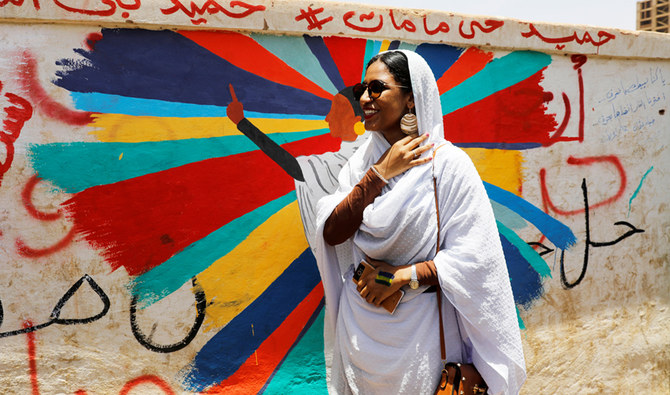DUBAI: It began with protests over the price of bread. But it was an image of Alaa Salah, a young woman dressed in white, standing on a car with her hand pointing up to the sky, that captured the world’s attention as the protests led to the toppling of Omar Al-Bashir.
For some women, the revolution was not just about bread — it was about regaining a feeling of safety inside their homes and fighting a regime that oppressed women.
Ihsan Abdulaziz, speaking from her Khartoum home, remembered the knock at her door. It was members of the security forces. They had come to arrest her.
“They didn’t even give me time to pack. I put on my abaya and veil and left with them,” she told Arab News, recalling the moment she was snatched away from her family.
Abdulaziz, a leader of the new Sudanese women’s movement, was arrested on Jan. 5, 2019. She was held for 58 days without charge or explanation.
She described the conditions of Omdurman women’s prison.
“The rooms were overcrowded. One of the cells, meant for solitary confinement, had 5 people inside it.”
Abdulaziz said they tried to fit two other women into the room, one of whom was believed to be over 75.
The female guards singled out detainees, treating them disrespectfully and delaying the delivery of medicine.
“Our prison was still better than others,” Abdulaziz added.
Abdulaziz, who had been detained on three previous occasions, learned that security forces beat up her son so severely that both his hands were in casts. “Even our kids, those of activists, are targeted.”
The associate director of Human Rights Watch’s Africa division, Jehanne Henry, said that thousands had been arrested and that women were among those being kept in custody without being charged
But the participation of Sudanese women in demonstrations is not new.
“Sudanese women have always been willing and strong to protest,” Henry told Arab News.
Salah’s white garment and golden earrings are inspired by the outfits that Sudanese women wore during revolutions in the 1960s and 1980s.
Women were active in other revolutions too, such as those in 2011 and 2013.
But there are more women taking to Sudan’s streets now.
“These protests have a much wider base, the Sudanese Professionals Association has mobilized so many professions,” Henry explained.
Women from all classes, interests, occupations and ages took to the streets this time.
“It is no longer limited to politically active women, all the women were out in the street,” Abdulaziz said.
Some would even estimate that almost 60 percent of the protesters were women, she added.
A Sudanese architecture graduate, who is living in the UAE, said most of her female friends and relatives participated in the demonstrations and sit-ins.
“Even my older aunts and grandmother took part in the protests, even those who were not politically engaged,” Ebaa Elghali told Arab News.
Women were the most disadvantaged group under Bashir’s regime which is why they were actively protesting against it, Elghali added.
Human Rights Watch said that public morality laws, implemented by Bashir, targeted women and curtailed their basic freedoms.
In 2009 Sudanese women started a movement as a protest against these laws.
“They are (the laws) dedicated to control the clothes of Sudanese women, many faced unjust treatment because of it,” Sudanese activist Tahani Abbas told Arab News.
“Sometimes they say the clothes are indecent, but they never specify how. You could be fully covered and they still won't like it,” Abdulaziz explained.
Although the regime claimed to follow Sharia, several Sudanese women said the government was as far removed from Islam as it could be.
Women faced various violations during the protests, such as “beatings and harassment by national security during arrests,” Henry said.
Some women were starting to report incidents of sexual harassment and assault, she added.




























